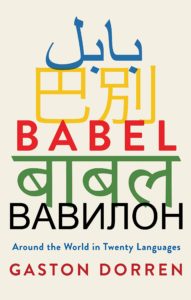To date, I’ve featured languages like Spanish, French, German, and English. While these are not mutually intelligible, they’re all part of the Indo-European language family, leaving me open to criticism that I’m being too Indo-Eurocentric (is that a word?). So I thought I’d change gears and jump to the Niger-Congo family, starting with the most widely spoken member of the bunch. In fact, Swahili is a lingua franca in a decent-sized chunk of East Africa. Here are 10 facts about the Swahili language to make you look smart and cultured. (As in the past, I referenced one of my favorite books about language, Babel.)
1
Modern Swahili owes its origins to the interactions of Arabs (particularly from Oman) with the inhabitants of the east coast of Africa over many centuries. Trade played a large role in this interaction (with cloves being an important commodity), and Swahili became a trade language. In the 1800s, the Omani Empire named Stone Town in Zanzibar (currently an autonomous region in Tanzania) as its capital, further solidifying cultural exchange.
2
Given this history, about 30 percent of Swahili vocabulary is of Arabic origin. In fact, Swahili derives its name from an Arabic term that refers to the coast. The native name of Swahili is Kiswahili. The prefix Ki- refers to language, making Kiswahili language of the coasts.
3
As above, Swahili is part of the Niger-Congo family, which contains somewhere around 1,400 languages. More specifically, Swahili is in the family’s large Bantu branch, encompassing languages throughout Central, East, and Southern Africa.
4
Unlike the vast majority of Bantu languages, Swahili is not a tonal language. (A tonal language is one in which the meanings of some words can completely change based on the tone used.)
5
Swahili has somewhere in the range of 5 to 15 million native speakers. Many more speak Swahili as a second language, with estimates regarding the total number of speakers varying widely. One such estimate is 135 million.
6
Swahili is widely spoken in Kenya and Tanzania, with a significant number of speakers also found in Burundi, Rwanda, Uganda, and the eastern half of the Democratic Republic of the Congo. Based on proximity, it can also be heard in parts of Somalia, Mozambique, Malawi, and Zambia. Countries such as South Sudan and South Africa have made efforts to formally introduce the language. In Comoros, the Comorian language is sometimes considered a dialect of Swahili. And, due to the cultural exchange previously mentioned, Swahili is still spoken in Oman.
7
Swahili was previously written in the Arabic script. After Europeans arrived in Africa in the 19th century, the written language was converted to the Latin alphabet, remaining that way today.
8
The earliest known documents written in Swahili are from 1711. (At the time, the Arabic script was still being used.) As far as written languages go, that makes Swahili really young.
9
As a result of the British presence in Africa, about 10 percent of Swahili vocabulary is of English origin. A few examples include basi (bus), penseli (pencil), mashine (machine), and polisi (police).
10
Swahili has also been a generous donor to the English language. Examples include words like safari, Kwanzaa, and dengue (as in dengue fever). Those who’ve played the game Jenga would be interested to know that’s the Swahili word for build.
To kickstart your Swahili language learning, go ahead and watch The Lion King again. Pay attention to the character names. Simba means lion, Rafiki means friend, Sarabi means mirage, Pumba means slow-witted, Nala means gift, and Shenzi means savage. And the expression hakuna matata means no worries. But don’t worry if you’re not feeling it. There’s always English.

4 Responses
I had picked up few words of Swahili when I was in Mombasa, Kenya. Our help at home, whose name was John would come in smiling every morning saying Habari Yako or how are you? Your article is very informative. Thank you for covering this language.
Fascinating! Would love to hear more about your time in Kenya. And thanks for the Swahili expression!
Interesting to learn about the origins of Swahili. Made me look up the map of East Africa and the Middle East. Enjoyed this article. Also, I can now tell my sister who lives in Oman that I know something about the country.
Thanks! Hopefully your sister will be impressed. 🙂